Paris 2024: A Virtuous Circle

21 July 2024 – Social businesses and circular economy principles are key to the sustainability legacy of Paris 2024. But can the Games accelerate to a new way of doing things? By Matthew Campelli and George Timms.
A bridge is such a wonderful visual metaphor for moving towards a brighter future and creating connecting blocks between the current status quo to something better. As humans, we have built bridges for centuries to explore unfamiliar places and seek out lands more promising than the ones we left behind.
Bridges create opportunities for people to experience new things and expand their worlds beyond their homes and immediate surroundings. It is hoped that the bridge that has been constructed alongside the recently built Aquatics Centre ahead of Paris 2024 will add texture to the lives of many people – particularly those living in its Saint-Denis region.
With trees, bushes and benches, the bridge will give people living in the area access to close-by green spaces, which are so rare in many big cities globally. Only about 11 per cent of Paris is covered by green space, while its 20 per cent of tree cover is lower than the European capital cities’ average of 29 per cent.
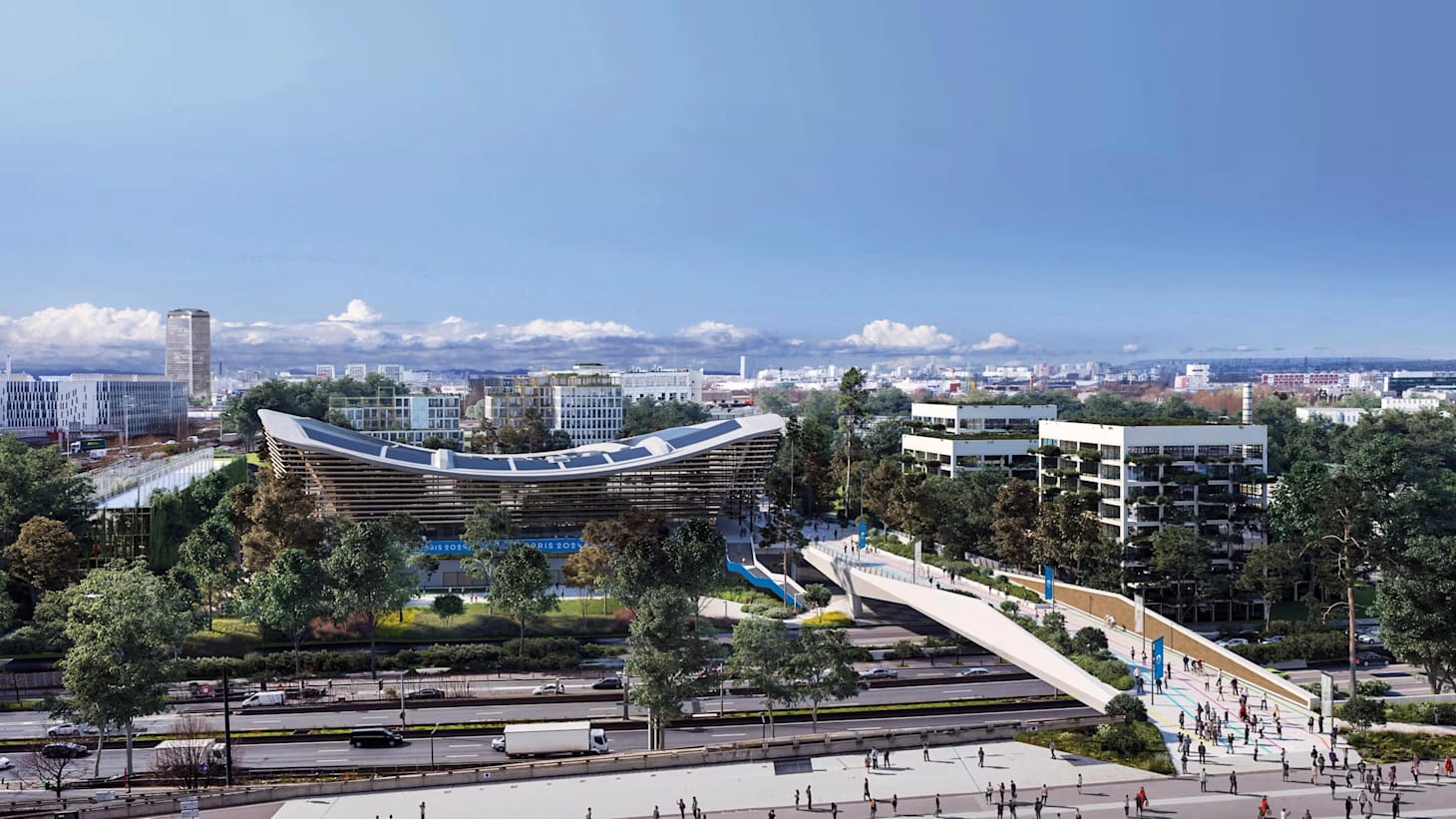
Urban areas with low socioeconomic status like Saint-Denis have, in general, disproportionately fewer green spaces available than affluent areas of cities, so amenities on the bridge will bring some much-needed respite for local people, particularly when contending with the surging temperatures during the summer.
Constructed across one of the city’s busiest motorways, the bridge connects three Paris metro stations, the Stade de France and the Aquatics Centre, which will host diving, artistic swimming and water polo qualification at Paris 2024 before becoming a community facility in the aftermath of the Games.
Both the bridge and the Aquatics Centre will be starting points for a new sustainability- and wellbeing-focused neighbourhood, which is being developed for the Saint-Denis area. Laure Mériaud, president and associate architect for Ateliers 2/3/4, says the facilities and the Games represent the “beginning of a new adventure” for an area of Paris that not only requires significant investment, but that also has one of the youngest populations in the whole of France.
At the heart of Paris 2024’s sustainability strategy, and its ambition to generate only half of the carbon emissions of previous Games in London and Rio, was the pledge to use a portfolio of sporting facilities of which 95 per cent were temporary or had already been built. However, the Aquatics Centre, one piece of permanent sporting infrastructure that did have to be developed from scratch, is perhaps one of the symbols that best represents the scale of the Organising Committee’s vision to redefine sustainability standards for multi-sport events.
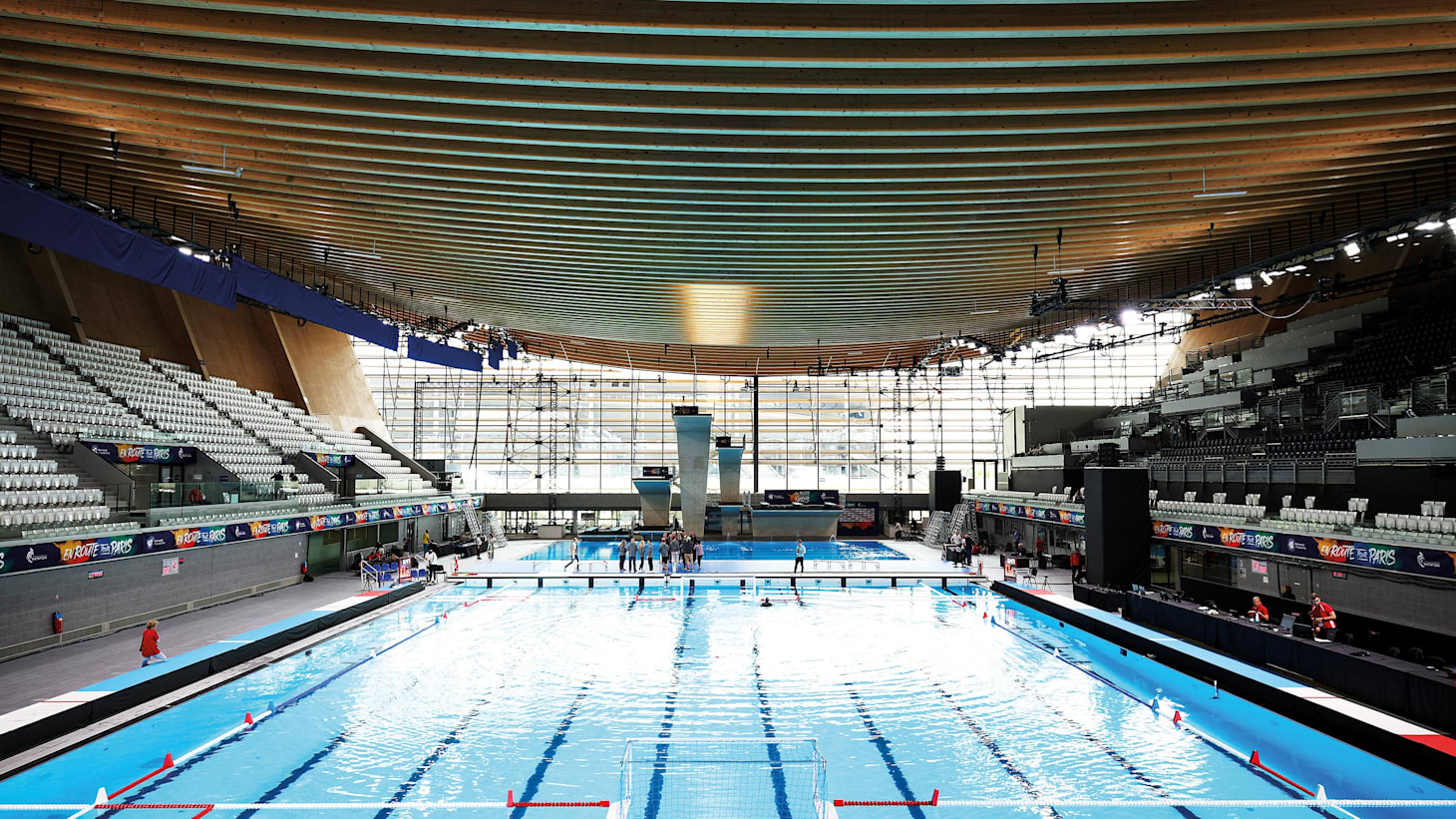
According to Mériaud and Cécilia Gross, partner at VenhoevenCS, which collaborated with Ateliers 2/3/4 in a consortium to develop the venue, every aspect of traditional aquatics centre design and construction was thoroughly reconsidered to align with the Games’ environmental objectives.
The shape of the roof – an eye-catching curve made from 55-centimetre-thick timber – will help slash the energy use in the facility by 50 per cent by reducing the need for air stability and heating. The shape of the pools will differ from previous editions of the Games, saving water by 25 per cent. And solar panels have covered the roof, providing a significant amount of energy for the centre.
“We want to do better with less. We had to rethink everything – the materials we used, the right measures to take. We had to make the right choice for the venue to remain relevant.”
Cécilia Gross, Partner at VenhoevenCS
To ensure the project venue aligned with the Games’ sensibilities and the needs of the city, the Métropole du Grand Paris (the city’s local authority) tendered the project out as a “DBFMO” (Design, Build, Finance, Maintain and Operate), so that professionals and organisations with expertise in these fields could combine their points of perspective and end up with a finished product that encapsulated environmental, human and economic sustainability.
Paris 2024’s sustainability strategy aligns with the Métropole’s own Climate, Air and Energy Plan, which has a number of objectives around increasing the city’s climate resilience, air quality and energy efficiency, as well as a 13-priority Biodiversity Plan. It was crucial that any new facility worked towards these wider environmental goals.
As well as taking cues from the local authority, the consortium interviewed local people in Saint-Denis about what they wanted from the facility in terms of sport, and what they needed from it in their everyday lives. During the Games and other major events, like the European Aquatics Championships, which Paris will host in 2026, the Aquatics Centre will be populated with 6,000 seats. This will be reduced to 3,000 seats for normal periods, with the additional 3,000 giving way to padel courts and other sporting facilities.
Le Pavé, an industrial start-up that only incorporated as a business in 2018, was handed the opportunity to produce those seats – as well as a further 8,000 for the Porte de La Chapelle Arena – because of its ability to manufacture them from 100 per cent plastic waste that was collected in the Paris region.
Lucas Philipponneau, Le Pavé’s chief of staff, tells the story of a young ambitious company, started by university friends with the desire to “rethink the value chain”, that had to transform overnight after being commissioned to support the circularity vision of Paris 2024.
“The company existed for a year when we received this challenge,” he says. “We went from being very small to having a dedicated team of engineers and the need to build factories in France to scale.
“The Olympics are an occasion to show what’s possible and to build things another way. We can create big projects with circular economy and social economic principles. The Games have made it possible to attempt a new level and stimulate innovation.”
Indeed, embedding a circular economy approach is one of the five strategic pillars of Paris 2024’s procurement strategy, which comprises five steps: rethinking ways to do things; reducing the use of resources; reusing equipment; recycling products; and reassembling the Games ecosystem.
While Le Pavé’s use of single-use plastics (HDPE plastic, which comes from products like shampoo bottles, and PS plastic, often located inside household items like fridges) falls squarely into the ‘recycle’ category of that hierarchy, ‘rethinking’ and ‘reducing’ are the first priority.
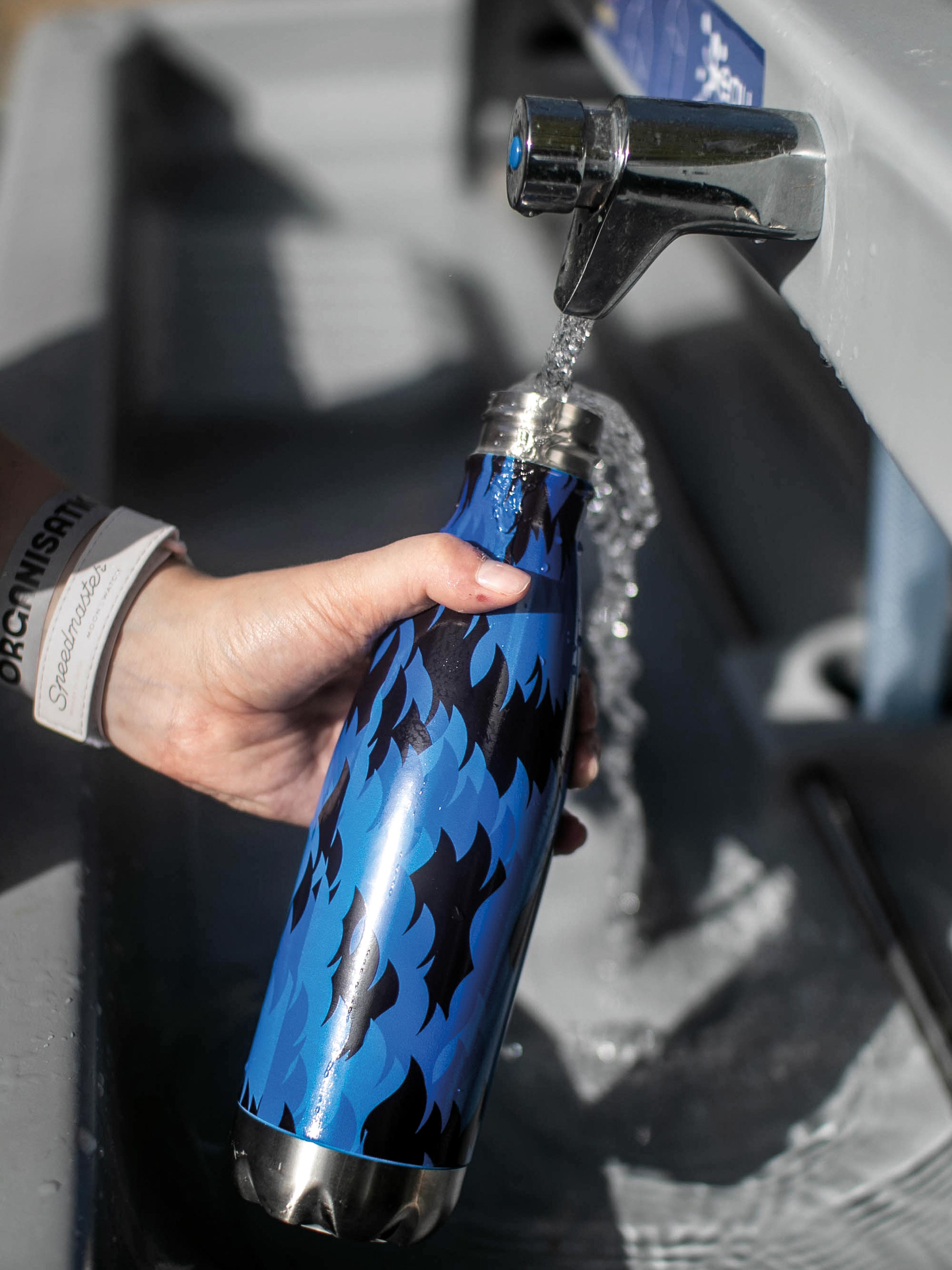
Paris 2024 has worked with Worldwide Olympic Partner Coca-Cola on reducing its packaging. Coca-Cola will install 700 beverage fountains across all Paris 2024 sites, and the organisers will install free drinking water points. Spectators will be allowed to enter all venues with their own reusable bottles, a notable exception to existing French regulations.
Around half of the 4.8 million tonnes of plastic used and disposed of in France annually is packaging. Of that, only 23 per cent is recycled – lower than the EU average of 38 per cent. This falls even further to 14 per cent in Paris. Around 37 per cent of waste produced in the city comes from packaging, and the Organising Committee has tried to address this further by requiring logistics partners to reduce their packaging and use of plastic, as well as by establishing a deposit system for pallets.
Paris 2024 extends its resource-saving ethos to the interior design of its 40 venues, meticulously assessing and consolidating needs, resulting in a reduction of furniture items from 800,000 to 600,000.
Furthermore, organisers have prioritised hiring over purchasing, with three-quarters of sports equipment and 75 per cent of electronic devices sourced through rental agreements. Strategic partnerships ensure that all stands, tents and bungalows for the Games have been hired, not bought, minimising the event’s environmental impact.
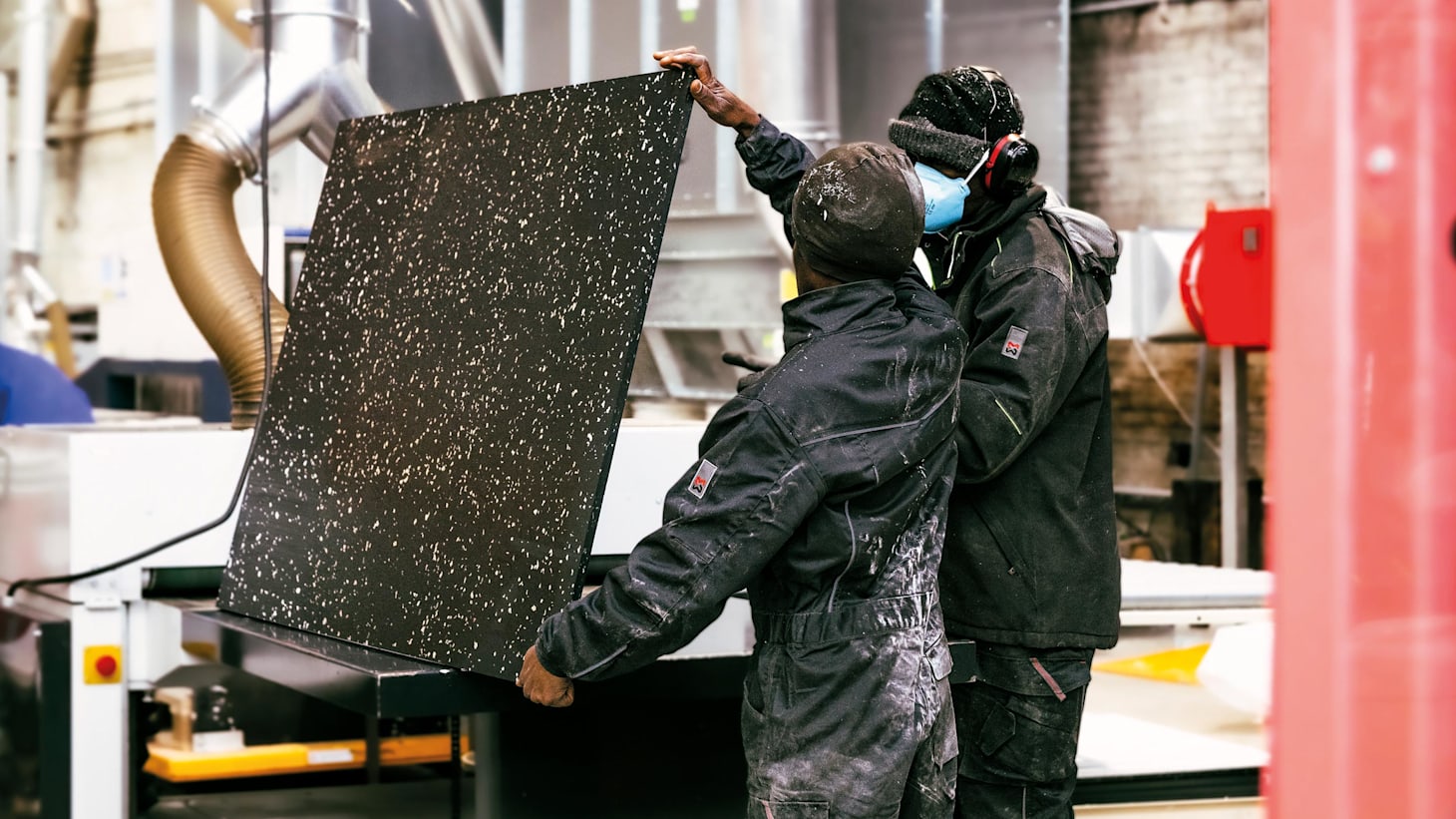
All of the furniture and 90 per cent of signage used for the Games will be given a second life, reused, redeployed or recycled, and 100 per cent of the materials used for temporary infrastructure will also be given a second life, with 50 per cent remaining in France.
Vincent Brenot, an environmental lawyer based in Paris, believes that France’s “advanced regulatory landscape” for circular economy and waste management means the Games have a significant opportunity to promote a more responsible model of production and consumption throughout the nation and beyond. According to EU law, large companies are obligated to partner with smaller, innovative companies to give them “access to public purchase”. The high-profile nature of the Games means they can be an “instrument of promotion” of the “real-life implementation of these principles”.
Ultimately, the Games present an opportunity for sport – and major sports events specifically – to rip up the rulebook and do things differently. Like the bridge outside the Aquatics Centre connecting the Saint-Denis suburb to a more sustainable and equitable future, Paris 2024 can act as a bridge to a new way of organising big events, where environmental and social responsibility are paramount.
Part of this is using its high profile to stimulate innovation and establish fertile ground for social and environmental entrepreneurship. While small, nimble start-ups like Le Pavé have been nurtured to support the circular economy goals of the Games, they also represent a wider vision for Paris 2024 to facilitate and supercharge the social and environmental entrepreneurship landscape.
To establish new precedents for major sports events, the Organising Committee created “ESS 2024” to forge a link to the teeming world of social entrepreneurship in the city and beyond. ESS 2024 has made it possible to inform, mobilise and support social businesses and entrepreneurs, positioning them at the heart of organising the Games. Joining forces with Paris 2024 and the Olympic Works Delivery Company (SOLIDEO), one of the main bodies supporting ESS 2024 is Les Canaux, that manages the House of Social and Solidarity Economies. Founded seven years ago, Les Canaux is a predominantly state-funded organisation that supports the development of an engaged economy (solidarity, circular and local) by training and raising awareness among citizens, businesses and communities about social and environmental innovation.
“The Olympics are a big sports event but also an economic event that can promote social business.”
Elisa Yavchitz, Director general of Les Canaux
After being moved by a speech delivered by 2006 Nobel Peace Prize winner Professor Muhammad Yunus when Paris was awarded the Games in 2017, Yavchitz had a “lightbulb moment”, realising the contribution Les Canaux could have through the Games.
The Yunus Centre, a global hub for social business created by Yunus, joined forces with Les Canaux to co-design the programme. Established in 2019 to “create a world of zero poverty, zero unemployment, and zero net carbon emissions”, the Yunus Centre positions “social businesses” as the remedy to help solve these three macro issues.
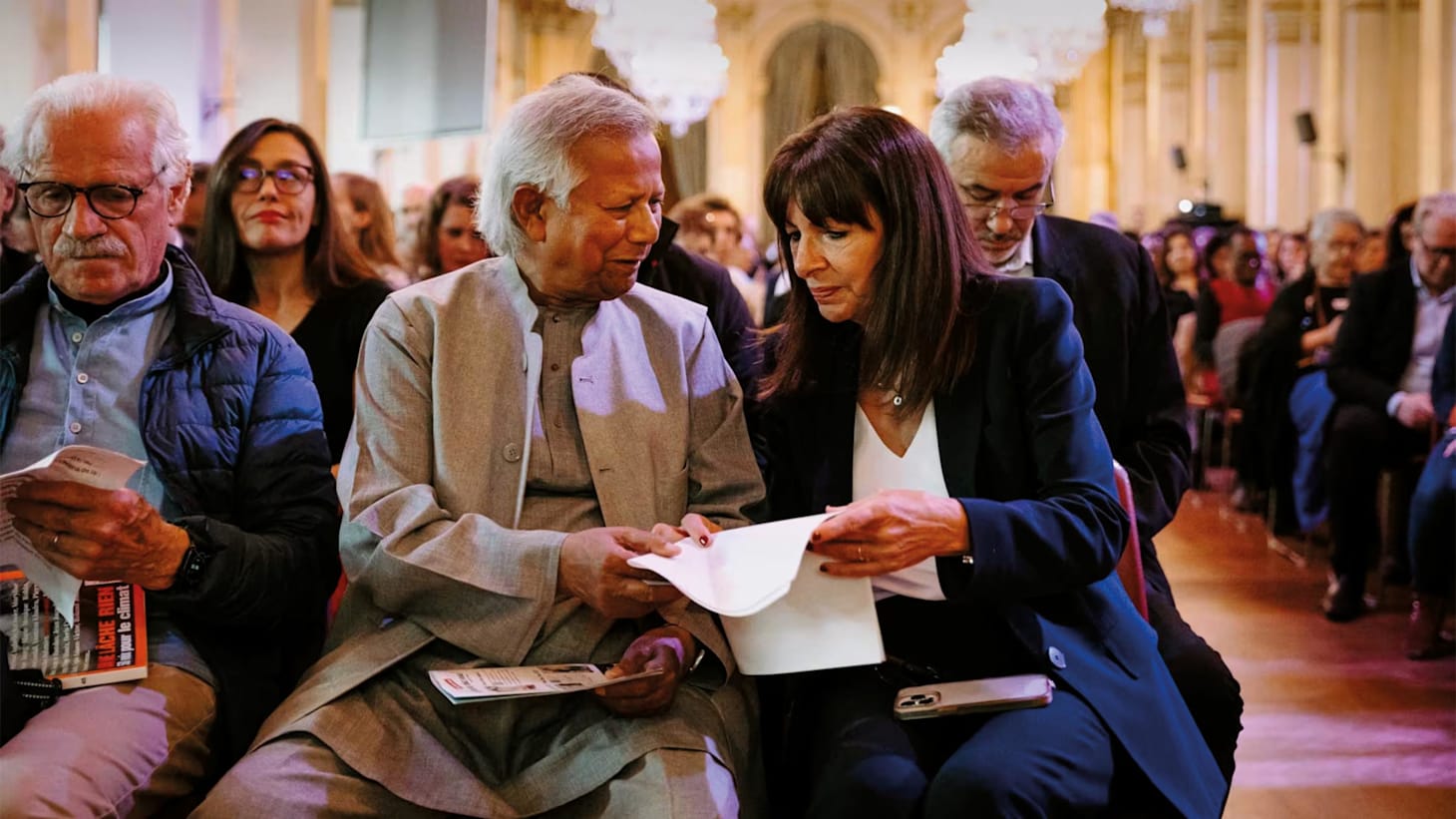
A social business, as defined by the Centre, has a primary aim to address a social problem, is financially self-sufficient and does not pay dividends to its owners. It is also well positioned to integrate and fast-track disabled people and long-term unemployed people into the workforce, says Yavchitz.
Connecting the significant economic opportunities of Paris 2024, she adds, is a huge part of the Games’ overall legacy as, often, small- and medium-sized social businesses have a solution, or partial solution, to big societal problems, but are held back by a lack of reputation or capital to really scale their work.
Yoan Noguier, a co-founder and the managing director of the Yunus Sports Hub (part of the Yunus Centre), hopes that the connection with the Games will deliver legitimacy to the social business model in the eyes of government and investors, and untangle its link with the charitable and philanthropic sector.
Around 460 social businesses have been given the opportunity to provide services for the Games, in the fields of construction, catering, furniture provision and laundry services, with nine of those businesses winning EUR 1.6 million worth of work.
“If we can use one per cent of the airtime of the Olympic Games to showcase these social businesses, that will really level the playing field, give social businesses a ‘halo effect’ and demonstrate that social businesses can win tenders and compete in the same field as big organisations,” Noguier says.
Through his experience as procurement manager for the Olympic Games Rio 2016, Noguier helped Yavchitz and Les Canaux understand what the Games would need, how to gain commitments of local authorities and share networks of social businesses around Paris. The result was ESS 2024, which helped to define tenders that were accessible to small- and medium-sized social businesses, as well as signposting opportunities for social businesses to partner up with larger firms, or to create their own consortium.
Like Le Pavé, Cycle Terre is a small social enterprise benefitting from the ESS 2024 programme. Born from a European experimentation project, Cycle Terre explores the use of raw earth materials to create construction items. Using rubble from construction sites (which represents about 90 per cent of urban waste), Cycle Terre produced mud bricks used to build the Porte de La Chapelle Arena, which will host badminton and rhythmic gymnastics, and the Olympic Village.
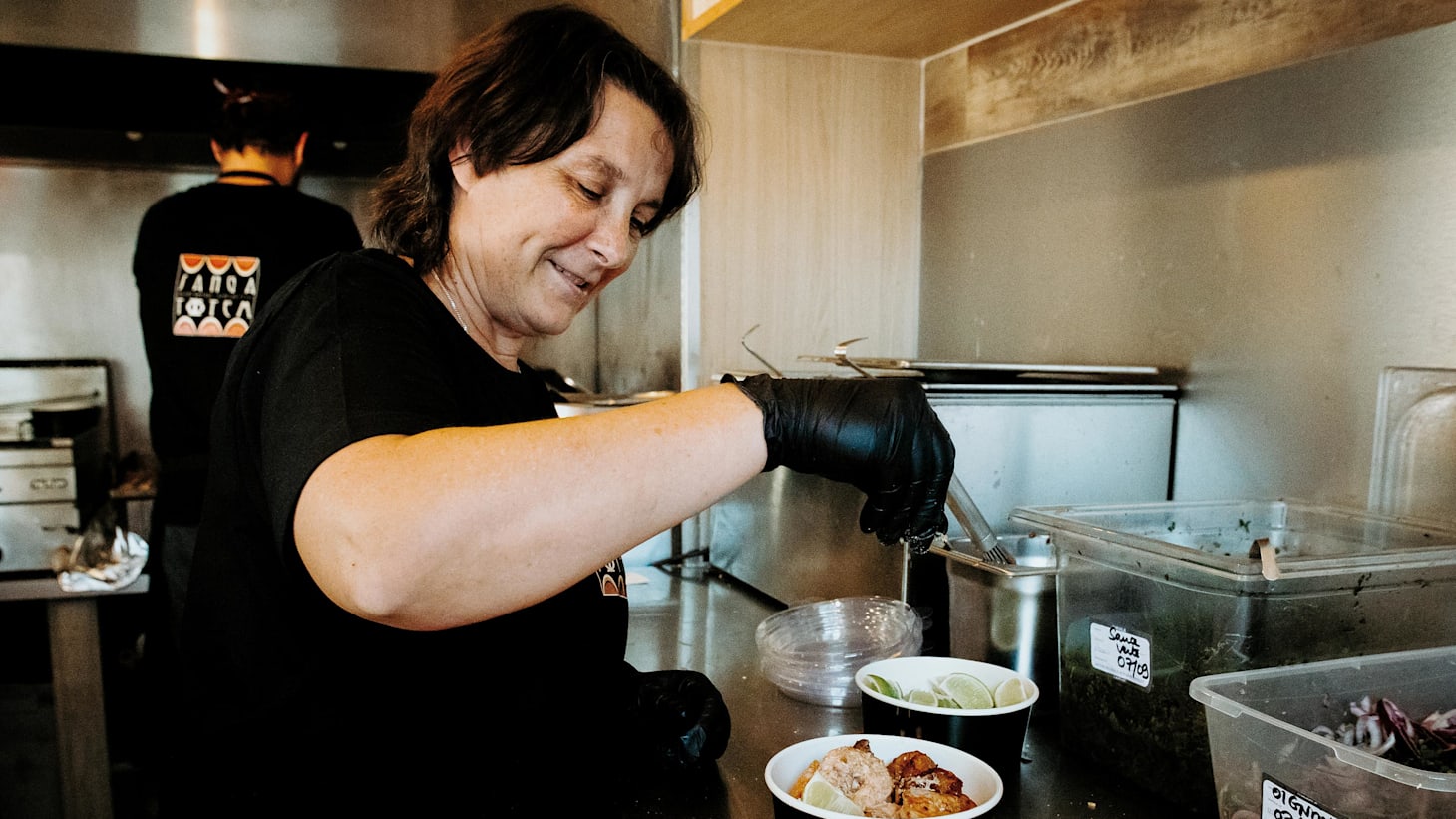
From 1 July, and throughout Paris 2024, Les Canaux will host a festival at the Maison des Canaux to promote companies like Le Pavé and Cycle Terre and celebrate their contribution to the Games. A photo exhibition curated by Yann Arthus-Bertrand will showcase the social businesses, and learning expeditions will introduce interested parties to the individuals behind the organisations and their innovations.
Beyond Paris 2024, Yavchitz believes that any big public project needs an intermediate programme like ESS 2024 to coordinate between organisers, public stakeholders and small social and medium enterprises.
“The cost of the programme is nothing compared to the benefit,” she states. Yavchitz and Noguier are not the only ones who feel this way. As part of its international promotion effort of ESS 2024, the Yunus Centre organises the Global Business Summit. At the 2022 edition in Turin, they approached organisers of the Olympic Winter Games Milano Cortina 2026 and, as Noguier describes, “engaged them in ESS 2024 and the idea of social procurement”.
One step quickly followed another when, at the beginning of 2024, a direct replication of ESS called Impact 2026 was launched, where the Yunus Centre will work with Italian organisation Fondazione Giacomo Brodolini in a similar vein to Les Canaux.
“Once is luck, twice is the norm,” remarks Noguier. “Hopefully another organisation will be established in Los Angeles if we manage to replicate it there.”
Paris 2024 may serve as the foundation for a new social and circular business model. Its true legacy will be seen if future hosts and major sporting events continue to strengthen and expand this bridge, establishing this method as the standard practice.
Published in the Olympic Review 122Download Media





